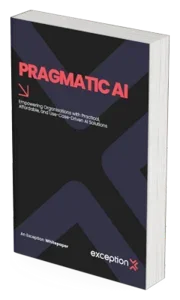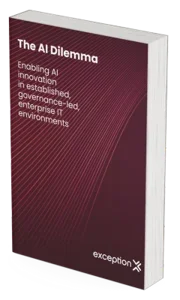Why Exception Has Joined the Business AI Alliance and What It Means for UK Companies
Exception has joined the Business AI Alliance to help UK organisations adopt AI responsibly, with a focus on practical value, strong governance and measurable outcomes.
How Organisations Build Real AI Business Infrastructure - And Why Most Get It Wrong
A practical guide to how organisations build real AI business infrastructure using sovereign models, structured discovery and safe, scalable rollout.
AI Enablement Workshops: How UK Organisations Are Turning AI Potential into Practical Impact
AI workshops are helping UK organisations move beyond the hype to identify high-value, low-effort use cases that deliver real efficiency gains and measurable ROI. Discover how Exception’s structured AI Enablement Workshops are transforming operations across energy, engineering, finance, government, and more.
Exception recognised as one of Scotland’s most responsible AI companies
Exception has been recognised as one of Scotland’s most responsible AI companies, earning the Bronze Social Value Quality Mark for our commitment to ethical, high-impact AI that delivers measurable value for people, organisations, and communities.
Turning Knowledge into a Business Asset with AI
Every organisation recognises the importance of time. The more of it your staff can spend engaging with customers, solving problems, and innovating, the more value your business creates. Yet in practice, too much time is lost in the gaps: hunting for documents, chasing colleagues for the latest version of a file, or trying to make sense of scattered systems.
Strawberry, Strawbery, Strawbrry: Counting the R’s and the art of AI change management
At first glance, it might seem amusing, or even trivial, that artificial intelligence can stumble over the simple task of counting the number of R’s in the word "strawberry."
Beyond the Hype: Helping Businesses in Scotland Move Past AI Disillusionment
Generative AI was hailed as a game-changer. In 2023 and 2024 it dominated headlines, promising to transform every aspect of work and life. Yet here we are in 2025, and Gartner has confirmed what many businesses already sense: generative AI has slid into the Trough of Disillusionment.
How Business Leaders Can Navigate AI Tooling and Drive Cultural Change
AI is no longer a futuristic concept—it’s here, embedded in the fabric of how businesses operate. The question is no longer if businesses should adopt AI but how they should integrate it effectively into their workflows.
The Agentic AI Revolution: More Than Automation, It's a Paradigm Shift
For years, we've seen Artificial Intelligence steadily weave its way into the business landscape, primarily as a tool for automation or insight generation. But now, we stand at the cusp of a far more profound transformation, driven by the rise of Agentic AI.
The Agentic AI Revolution: More Than Automation
For years, we've seen Artificial Intelligence steadily weave its way into the business landscape, primarily as a tool for automation or insight generation. But now, we stand at the cusp of a far more profound transformation, driven by the rise of Agentic AI.
Why We Replaced Salesforce
Over the past five weeks, we’ve taken a bold step: we replaced Salesforce, one of the world’s most established CRM platforms, with our own AI-powered application and agent. This wasn’t just a cost-cutting exercise (although we’ve certainly made significant savings). It was about taking control of our data, accelerating how we work, and building something that is fully ours.
UX is dead, long live UX
Agentic AI is storming the digital landscape, and it’s torching static websites and HTML’s outdated reign to unlock a new era of business optimisation. For some time, UX and UI has not just been about pretty interfaces, they’re the key to supercharging efficiency, slashing costs, and transforming customer experiences, especially in industries like financial services grappling with legacy applications.
Why UK Manufacturing Needs an AI Reset
Recent analysis paints a worrying picture for UK manufacturing. While the sector has long been a cornerstone of our economy, our adoption of automation and AI technologies lags significantly behind global peers.
Pragmatic AI
AI offers limitless possibilities, but its success depends on practical, use-case-driven applications.
Valuable insights into the power of AI while navigating the complexities of managing enterprise estates.
The AI Dilemma
The Big DORA Switch-On
Practical advice on implementing robust DORA-compliant risk management, incident reporting, and resilience testing.
The Thin Digital Line
This visionary podcast explores the future of policing in Britain in the year 2045.
Across six episodes, host Jason Harwin and expert guests from across the UK police service discuss AI’s impact, data-driven strategies, the ethical challenges of digital surveillance, the evolution of cybercrime, and the challenge of change. Gain insights into the technological advancements that will shape the next generation of law enforcement and the evolving role of the police in a tech-driven world.
















